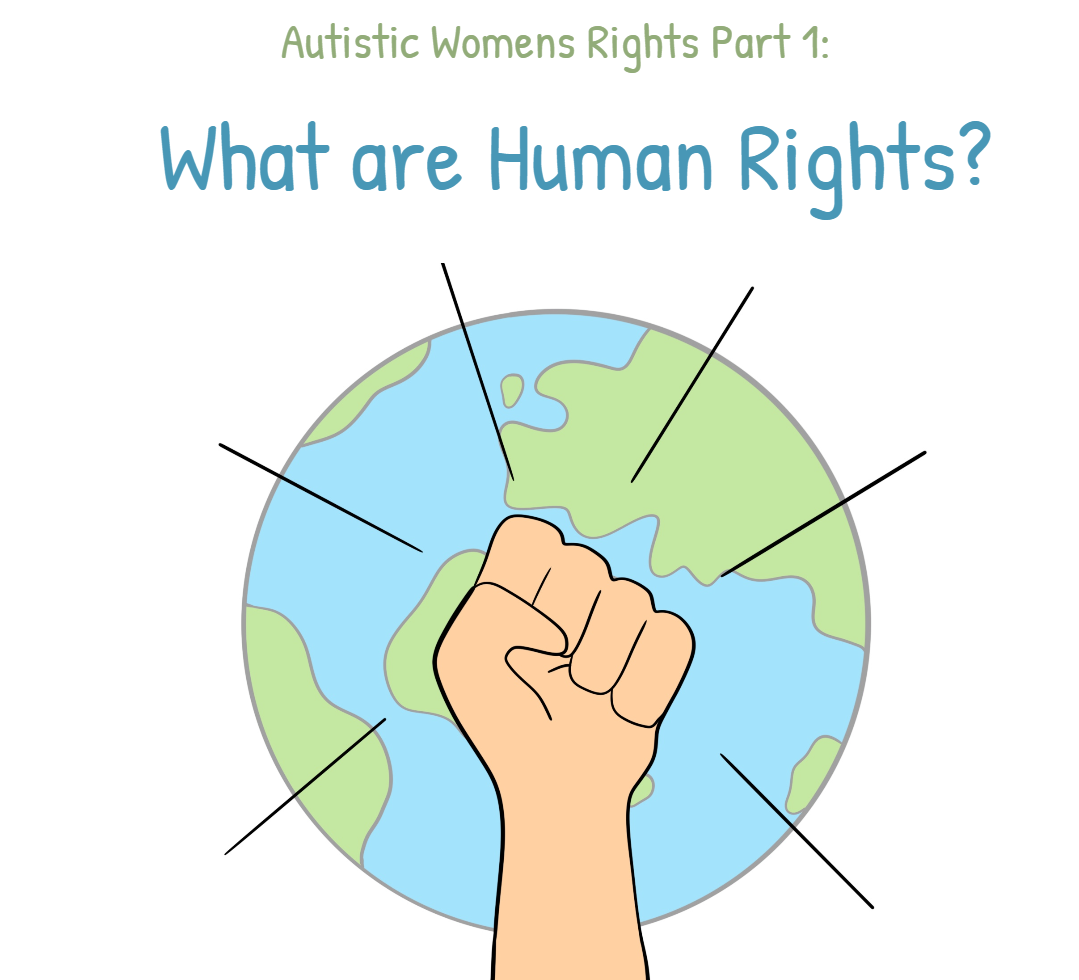Over the last couple of years, as I’ve spent more and more of my time advocating for disability, mental health, and womens rights, I’ve also become more passionate about human rights. I think human rights are something we all have a general awareness of, and a passion for protecting – as we grow up we see charities like Action Aid or Amnesty and we see some of their current campaigns, and we do want to support them, but it’s an area I’ve not previously properly explored. However, my advocacy work has, over time, developed and moved into focusing more on rights and equality, and I think I have come to realise that my passion lies in fighting for the equal rights for autistic women. Specifically, my dream is for a world where autistic women globally have equal health rights and live free from gender violence and discrimination. Where does that begin? Well, with human rights.
What are ‘human rights’?
Human rights are the basic rights and freedoms that belong to every person in the world. They have three main qualities:
- They are universal, which means they apply to everyone, no matter who you are, where you come from, or what you believe.
- They are inalienable, which means they cannot be taken away from us.
- They are indivisible and interdependent, which means all of them apply and people cannot pick and choose which ones do or don’t apply.
Some examples of human rights include the right to live freely and safely, the right to express your opinions, the right to education, the right to work, and the right to health care. They also include freedom from discrimination, which means everyone should be treated equally and fairly, no matter their race, religion, gender, disability, or any other status. In the United Kingdom our human rights are currently protected under the Human Rights Act 1998 – it sets out the fundamental rights and freedoms that everyone in the UK is entitled to.
Why are they important?
Human rights are important because they ensure that everyone is treated with dignity and respect. They protect us from abuses and injustices, allowing us to live freely and safely. When human rights are respected, people have the opportunity to reach their full potential and contribute positively to society. In a world where many people face challenges like poverty, discrimination, and conflict, human rights serve as a common framework for justice and fairness.
Who protects these rights?
Many organisations work to protect and promote human rights around the world, but two of the most important ones are the United Nations (UN) and the World Health Organization (WHO). The UN is an international organization made up of countries from all over the world. It was founded in 1945 after World War II to promote peace, security, and cooperation among nations – including to promote and protect human rights internationally. The foundations of this body of human rights law are the Charter of the United Nations and the Universal Declaration of Human Rights, adopted by the General Assembly in 1945 and 1948, respectively. These ‘milestone’ documents set out the fundamental human rights that should be universally protected and were groundbreaking steps in recognising formally that every person has certain rights simply because they are human.
WHO, on the other hand, is a specialised agency of the UN responsible for global public health. While WHO primarily focuses on health issues, it plays a crucial role in protecting human rights by ensuring everyone has access to essential health services without discrimination. The right to health is a fundamental part of our human rights, and WHO works to ensure that everyone, everywhere, can achieve the highest possible level of health. This includes efforts to combat diseases, provide vaccinations, and promote healthy living conditions, but also things like equal access to healthcare, reasonable adjustments, and living in a world free of gender violence and sexual abuse.
Many charities uphold the UN and WHO’s work, and fight for human rights globally, including Amnesty International, Plan International, and CARE International. Other charities focus on specific sets of human rights or certain groups human rights, for example The Fawcett Society concentrates on womens rights in the UK, and Scope campaign for disability rights nationally.

Leave a Reply